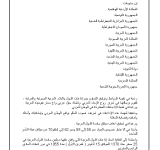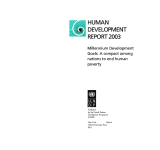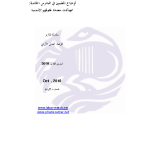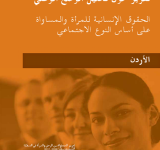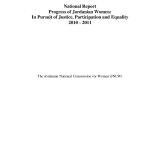agreements
This report provides an assessment of the Millennium Development Goals;; laid out by the UN Millennium Declaration. The UN Millennium Declaration was adopted in September of 2000 as a commitment on the part of the world's leading nations to reduce poverty;; improve health and promote peace;; human rights;; and environmental sustainability. The Millennium Development Goals are specific;; measurable targets that aim to reduce extreme global poverty by the year 2015. This report analyzes the challenges and barriers to meeting these goals as of 2003;; examining the successes and failures of various nations and the gaps that exist between regions and countries with regards to economic growth and human development. This report then examines the successes and failures of public and private policies with regards to hunger;; health;; water and sanitation;; education;; and environmental sustainability. This report also analyzes the participation of civil society throughout the world and the mobilization of grassroots support for the various human development goals. Finally;; this report presents a number of recommendations on what countries can do to best support these goals.
ياتي اصدار هذا التقرير في ضمن سلسلة التقارير الشهرية التي يعدها المرصد العمالي الأردني التابع لمركز الفينيق للدراسات الاقتصادية والمعلوماتية بالتعاون مع مؤسسة "فريدريش ايبرت" الألمانية. وهذا التقرير أصدر في يوم المعلم العالمي;; ويتناول الظروف التي يعمل فيها المعلمون والمعلمات العاملون في المدارس الخاصة ورياض الأطفال في مختلف مدارس القطاع الخاص في الأردن. وكما يتناول أعداداً للعاملين في هذا القطاع وتوزيعهم الجغرافي في مدارس المملكة. واعتمد التقرير على جمع بيانات أولية حول أعداد المدارس الخاصة والعاملين فيها والمعلمين من أكثر من مصدر;; وهذا إلى جانب اجراء العشرات من المقابلات الشخصية مع العديد من المعلمين العاملين في هذه المدارس. وكما قدم التقرير مجموعة من التوصيات التي من شأنها التخفيف من الانتهاكات التي يتعرض لها العاملون في هذا القطاع.
وﻳﻜﻤﻦ اﻟهدف اﻟﻌﺎم ﻣﻦ اﻟﺘﻘﺮﻳﺮ اﻟﻮﻃﻨﻲ ﻓﻲ اﻟﻘﻴﺎم ﺑﺘﺤﻠﻴﻞ وﺿﻊ ﺣﻘﻮق اﻟﻤﺮأة واﻟﻤﺴﺎواة ﻋﻠﻰ أﺳﺎس اﻟﻨﻮع ﺑﺎﻟﺘﺮﻛﻴﺰ ﻋﻠﻰ اﻹﺻﻼﺣﺎت اﻟﻘﺎﻧﻮﻧﻴﺔ واﻟﻤﺸﺎرﻛﺔ ﻓﻲ ﺻﻨﻊ اﻟﻘﺮار ﻓﻲ اﻟﻤﺠﺎﻟﻴﻦ اﻟﻌﺎم واﻟﺨﺎص واﻟﻌﻨﻒ اﻟﻤﺮﺗﻜﺐ ﻋﻠﻰ أﺳﺎس
This national report is designed to trace the progress of women in various fields;; monitoring achievements;; and highlighting gaps and failures;; as well as analyzing indicators;; recommending measures;; and measuring levels of achievements in the implementation of plans and strategies. The main themes were selected according to national priorities dictated by each stage: Legal Protection for Women's Right to Access Justice;; Participation;; the Economic Empowerment of Jordanian Women;; Equality;; Citizenship and Decision-Making in Public Life. The conclusions of this report confirm that a much smaller effort was exerted at the level of providing information;; data and the provision of services in the area of providing justice and facilitating ways of achieving it. The lack of knowledge about available services among women;; whether provided by civil society organizations or government institutions;; affects women's ability to access justice negatively. Regarding the economic participation the Policies and plans that targeted empowering women economically show that the result of these policies was weak and limited. Difficulty of women’s access to job opportunities in the private sector and inequitable pay between the sexes;; lack of supporting services to working women;; including childcare Facilities;; poor matching between education outputs and skills required in the labor market and the traditional social standards that contribute to directing females towards certain professions. The report proposed general recommendations and directions that include quick solutions to deal with the main highlighted challenges.
